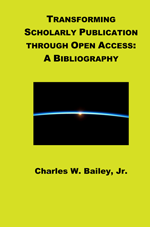The Research Councils UK has announced its open access funding plan.
Here's an excerpt from the press release:
Research Councils UK has today, 8th November, announced the details of the block grant funding mechanism that it is introducing to aid implementation of its policy on Open Access that was announced in July and is due to come into effect in April 2013. . . .
In the first year (2013/14), RCUK will provide funding to enable around 45% of Research Council funded research papers to be published using Gold Open Access growing to over 50% in the second year. By the fifth year (2017/18) funding is expected to be provided to enable approximately 75% of Research Council funded research papers to be published using Gold Open Access. The remaining 25% of Research Council funded papers, it is expected will be delivered via the Green Open Access model. The same compliance expectation applies to Research Council institutes, and separate funding arrangements are being put in place to facilitate this.
Universities will receive APC publication funding in proportion to the amount of direct labour costs awarded on grants that they have received over the three years from April 2009 to March 2012. Direct labour costs have been used as a proxy of research effort leading to the generation of publications.

